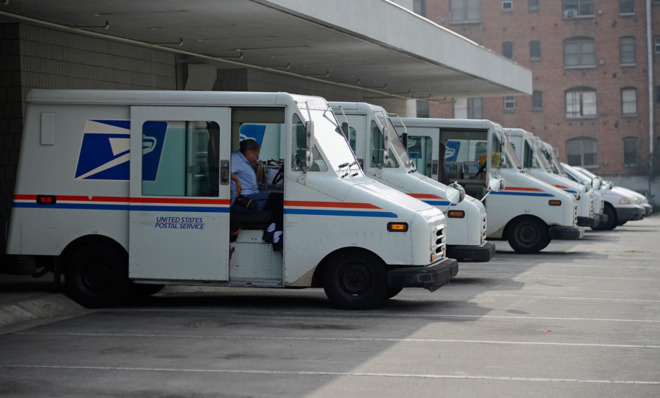Why does Congress insist on destroying the Postal Service?
With friends like these...


A free daily email with the biggest news stories of the day – and the best features from TheWeek.com
You are now subscribed
Your newsletter sign-up was successful
The $1.1 trillion omnibus spending bill expected to clear Congress this week has a little something for just about everyone — except postal workers. Tucked in among the bill's 1,582 pages are instructions to the U.S. Postal Service "that 6-day delivery and rural delivery of mail shall continue at not less than the 1983 level." Also, "none of the funds provided in this Act shall be used to consolidate or close small rural and other small post offices in fiscal year 2014."
That blocks for another year the USPS's bold plan (or a cry for help) from last February to end Saturday delivery. Closing little-used post offices is also a perennial suggestion by the red-ink-bleeding quasi-independent government agency. The Postal Service didn't ask Congress to approve its five-day mail plan, but Congress shut it down anyway.
Last fiscal year, the USPS lost $5 billion. This bill handcuffs the USPS for another year, at least.
The Week
Escape your echo chamber. Get the facts behind the news, plus analysis from multiple perspectives.

Sign up for The Week's Free Newsletters
From our morning news briefing to a weekly Good News Newsletter, get the best of The Week delivered directly to your inbox.
From our morning news briefing to a weekly Good News Newsletter, get the best of The Week delivered directly to your inbox.
The marching orders from Congress wouldn't be so bad if lawmakers "had decided to appropriate money to keep rural post offices open" or offset the costs of Saturday delivery, says Slate's Matthew Yglesias. "But Congress in its wisdom has not delivered any money."
And that pretty much encapsulates the troubled relationship between Congress and the USPS. Lawmakers want the Postal Service to run itself like a for-profit business, but they retain the right of final say over all its major business decisions. The USPS is legally obligated to serve every address in the U.S. and its territories, but it can't set its own prices, decide where to expand or cut its operations, or make other basic business decisions.
Members of Congress representing rural areas are especially adamant that the USPS serve their constituents. This involves maintaining money-losing post offices in places where other types of service would be more cost-effective. The push to end Saturday delivery is fine with most Americans — 71 percent, according to a CBS News poll last February; 80 percent (including 76 percent of rural respondents), according to an Ipsos poll commissioned by the USPS. But greeting card and direct mail companies strongly oppose the move, and their lobbyists have made sure Congress knows it.
The biggest slap Congress has delivered to the USPS, though, is a 2006 decision to make the agency pre-fund its pensions for 75 years, an onerous burden not required of any other government agency, let alone adopted by any private company. Most of the USPS's losses are caused by this requirement. The other factor is the steady decline in First Class mail, as more people use the internet for routine correspondence.
A free daily email with the biggest news stories of the day – and the best features from TheWeek.com
The Postal Service keeps on coming up with plans to make itself profitable, or a least less unprofitable, and Congress keeps saying no or ignoring the USPS's structural issues.
Part of the problem is that change is hard, and people like the Postal Service they have now. A survey from the American Customer Satisfaction Index released in December found that 77 percent of Americans are happy with the USPS, putting the staid old institution above internet travel sites, search engines (sorry, Google), computer software, telephone companies, and internet service providers.
Consumers only feel the USPS's financial pain when the price of stamps rises — as it will on Jan. 26, to 49 cents for a First Class stamp, from 46 cents, thanks to a Christmas Eve decision by the Postal Regulatory Commission. This modest, temporary (it can't last for more than two years) hike has prompted a strong reaction from the Greeting Card Association, direct marketers, catalog companies, and others who rely on the post office.
Congress is doing what it does best these days: Kicking the problem down the road. Maybe there's a bigger plan here — forcing a privatization of the postal service, like Britain has done, for example — but it's more likely just another example of parochial politics trumping the broader good.
Peter has worked as a news and culture writer and editor at The Week since the site's launch in 2008. He covers politics, world affairs, religion and cultural currents. His journalism career began as a copy editor at a financial newswire and has included editorial positions at The New York Times Magazine, Facts on File, and Oregon State University.
-
 Samurai: a ‘blockbuster’ display of Japanese heritage
Samurai: a ‘blockbuster’ display of Japanese heritageThe Week Recommends British Museum show offers a ‘scintillating journey’ through ‘a world of gore, power and artistic beauty’
-
 BMW iX3: a ‘revolution’ for the German car brand
BMW iX3: a ‘revolution’ for the German car brandThe Week Recommends The electric SUV promises a ‘great balance between ride comfort and driving fun’
-
 Munich Security Conference: a showdown between Europe and Trump?
Munich Security Conference: a showdown between Europe and Trump?Today’s Big Question Report suggests European leaders believe they can no longer rely on the US for military support – but decoupling is easier said than done
